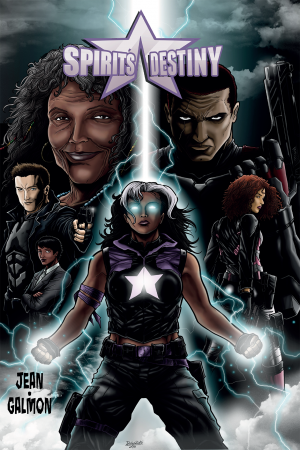Review: Spirit's Destiny #1
Grammar and spelling is extremely important in resumes. It's a common understanding that when sorting through job applications most employers will immediately toss resumes that have common grammatical errors or poor formatting without actually checking the individual's qualifications. There is so much material that crosses their desk it becomes a matter of simply weeding out that which doesn't meet minimum standards first, an immediate reinforcement of the quality an employee is expected to adhere to. As a critic, I am not an authority. I don't make or break comics, especially the indiest of indies, as many of my reviews of self published books that don't get a push from an already well known creator won't even break 100 views. In this way, the employer metaphor doesn't completely carry through, but reading Spirit's Destiny I could relate to that mentality. So many books come across my table, big and small, that to open a book and the very first thing I see is a period at the end of a question sentence makes me want to stop reading and just review that mistake. But I read on anyway and found the same mistake repeated twice on page 20.
This isn't even a terrible book. It's painfully generic from a storytelling perspective: high-school girl who nobody understands has a mysterious past that will eventually result in her uncovering  superhero-ey abilities after a laboratory accident. There are some irritating shortcuts in the plotting, and nothing insightful about Destiny's character to overlook her mostly bratty teenager personality, but the comic is paced out slowly enough to let the book breath in a way I appreciated. The art isn't terrible either. It's sporadic in quality, the linework starting off well but dipping suddenly in places. Colorwork, as seems to be expected, isn't unreadable but doesn't help, smudging everything out with mismatched grays and browns. Reading indie superhero books will make you hate superheroes but this one is just forgettable, not actively terrible. I will, however, probably remember this one at least faintly, for the previously mentioned reason.
superhero-ey abilities after a laboratory accident. There are some irritating shortcuts in the plotting, and nothing insightful about Destiny's character to overlook her mostly bratty teenager personality, but the comic is paced out slowly enough to let the book breath in a way I appreciated. The art isn't terrible either. It's sporadic in quality, the linework starting off well but dipping suddenly in places. Colorwork, as seems to be expected, isn't unreadable but doesn't help, smudging everything out with mismatched grays and browns. Reading indie superhero books will make you hate superheroes but this one is just forgettable, not actively terrible. I will, however, probably remember this one at least faintly, for the previously mentioned reason.
Making a glaring grammatical error in the very first two lines of text on the introductory interior page of a book is bad. Having worked with my fair share of self-publishing superhero creators, I know the long term goal for most of them is franchising. I worked with one writer who promised that I wouldn't have any trouble making money from collaborating with him because as soon as the book hit it would be snatched up for a movie deal and an animated series within the month. To begin with, it is delusional to believe there is a huge appetite for self-published superhero books out there. The major non-Big Two superhero titles of the last ten to twenty years having largely come from working Marvel and DC writers with pre-existing fanbases. Far safer bets are made with post-apocalyptic stories or are female-oriented magical dramedies. Second, I can't remember an original superhero pitch that actually struck me as having potential since John Pross's Posers universe (which is largely why I tried to help make that thing go for two years), nearly every book being some Sweded version of Bendis's Ultimate Spider-Man or a Frank Miller influenced Punisher/Batman/Spawn clone. It's the comic industry equivalent of scratching lotto tickets.
I am a critic. My voice and influence is limited. I do not make or break books, so I don't act as the arbitrating figure of the employer in my opening metaphor. It's not in my power to influence, only to assess and voice opinion in a public forum. However, if the goal is to make one's fortune on the back of another caped crusader, do you know who does act as the avatar of said employer? Studios. Editors. Television executives. Anyone you would seek to impress, to sell your wildly original ideas to, to astound with the biggest industry flipping product since The Tick. They might not be in the habit of handing out golden tickets, but they are watching, they might even pick up your book. And if the very first thing they see leap out at them, as it did to me, on the opening page of your punchy-cape opus is a basic punctuation error? The book might as well had never passed into their hands.
Review copy provided by Indie Stash
[su_box title="Score: 2/5" style="glass" box_color="#8955ab" radius="6"]
[/su_box]